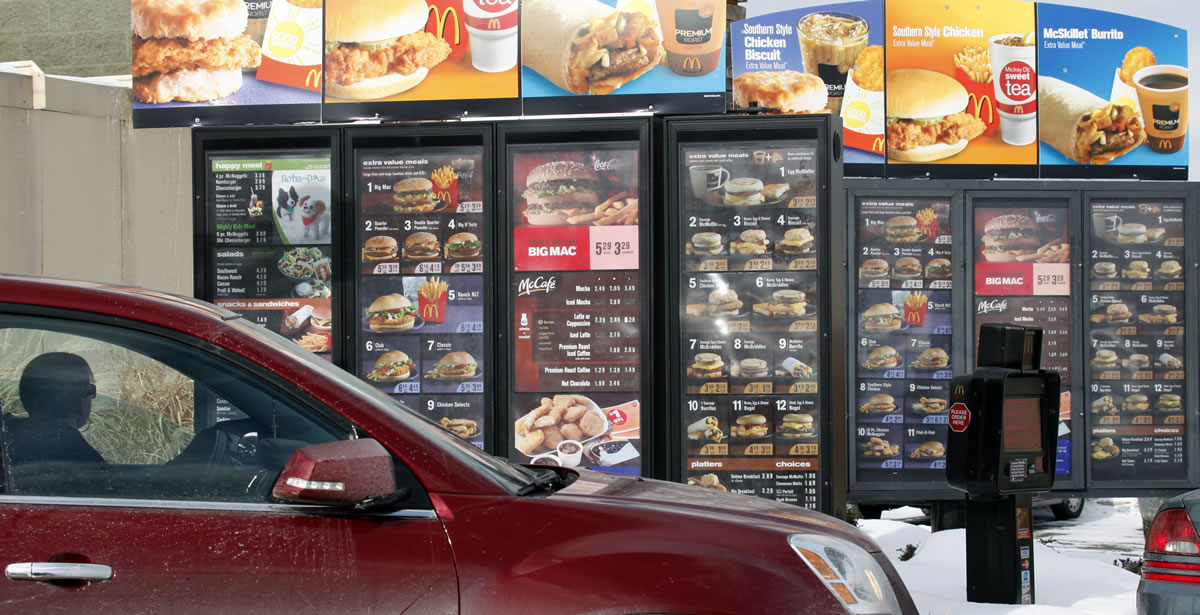NEW YORK — Fast-food chains have a New Year’s resolution: Drop the junk.
As people express distaste for food they think is overly processed, McDonald’s, Taco Bell and other chains are trying to shed their reputation for serving reheated meals that are loaded with chemicals. That includes rethinking the use of artificial preservatives and other ingredients customers find objectionable.
“This demand for fresh and real is on the rise,” said Greg Creed, CEO of Yum Brands, which owns Taco Bell, KFC and Pizza Hut.
During the presentation for analysts and investors last month, Creed said the company needs to be more transparent about ingredients and use fewer preservatives.
Recasting fast food as “fresh” and “real” will be tricky, in large part because it’s so universally regarded as cheap and greasy. Another problem is that terms such as “fresh,” “real” and “healthy” have nebulous meanings, making it hard for companies to pin down how to approach transformation.
One way chains are looking to redefine themselves is by purging recipes of chemicals people might find unappetizing. Already, packaged food and beverage companies have reformulated products to remove such ingredients, even while standing by their safety. PepsiCo, for instance, said it would remove brominated vegetable oil from Gatorade after a petition by a teenager noted it isn’t approved for use in some markets overseas.
And fast-food chains are indicating they want to jump on the “clean label” trend too:
• Last month, McDonald’s USA President Mike Andres outlined improvements the company is working on, including the simplification of ingredient labels. Without providing details, he said to expect some changes in early 2015.
“Why do we need to have preservatives in our food?” Andres asked, noting McDonald’s restaurants go through supplies quickly. “We probably don’t.”
• Subway, a privately held company that doesn’t disclose sales, started airing TV ads for its new chicken strips free of artificial preservatives and flavors.
• Chick-fil-A said in 2013 it would remove high-fructose corn syrup from buns and artificial dyes from its dressings. A couple months later, it said it plans to serve only chicken raised without antibiotics within five years.
• Carl’s Jr. last month introduced an “all-natural” burger with no added hormones, antibiotics or steroids.
It’s not clear how far fast-food companies will go in reformulating recipes. But the nation’s biggest chains are facing growing competition. In the latest quarter, customer visits to traditional fast-food hamburger chains declined 3 percent from a year ago, according to market researcher NPD Group. Fast-casual chains saw visits rise 8 percent.
Part of the appeal of fast-casual chains is that they position themselves as being higher in quality. Chipotle, which touts its use of organic ingredients and meat without antibiotics, said sales at established locations surged 19.8 percent in the most recent quarter. And Panera vowed this summer to remove artificial colors, flavors and preservatives from its food by 2016.
Dan Coudreaut, executive chef at McDonald’s, has noted the difficulties in changing recipes. In an interview last year, he said McDonald’s is looking at ways to use culinary techniques to replace the functions of certain ingredients.
“If you take (an ingredient) out, what are you giving up?” he said.
Michele Simon, a public health lawyer and author of “Appetite for Profit: How the Food Industry Undermines our Health and How to Fight Back,” said getting rid of additives here and there won’t be enough to change the way people think about fast-food.
“That’s just rearranging the deck chairs on the Titanic,” Simon said. “These companies have a fundamental problem in who they are.”



